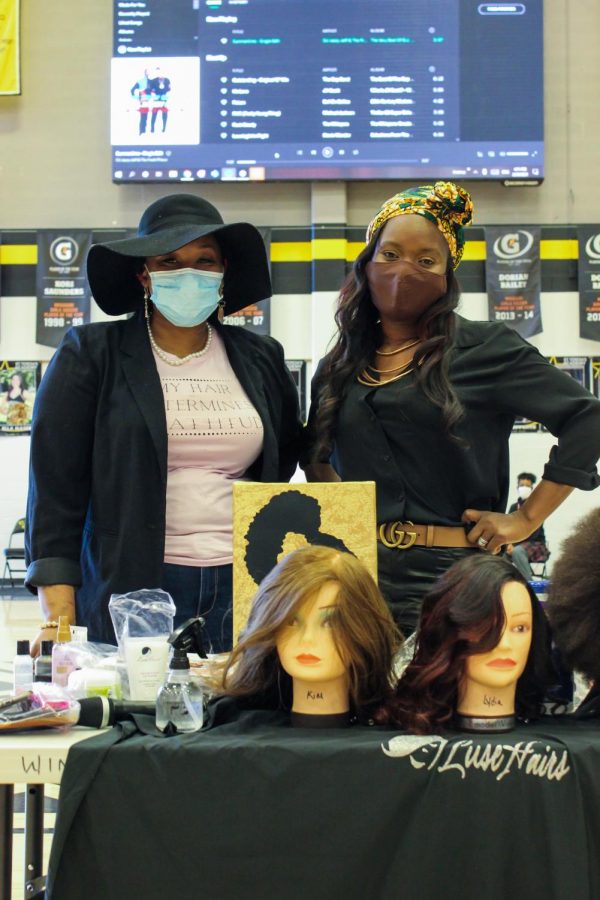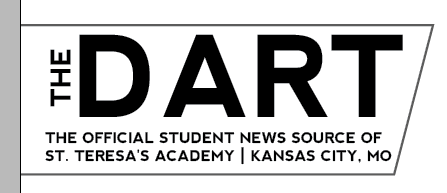We Need To Do More To Encourage Diversity On Campus
Issues of diversity at STA are being taken care of, but it takes many working towards a common goal to achieve change.
Lusette Walker, right, stands with her partner in front of their demonstration table Feb. 23. Walker has owned Luse Hair Salon for 12 years and it is located on the corner of Grand Blvd. and 20th St. photo by Sydney Allen
March 11, 2021
Encouraging diversity and integration is an ongoing struggle for change, especially in private schools such as STA. According to the National Center for Education Statistics (NCES), the percentage of African American students at private schools is typically in the range of 6 – 10%. This statistic can lead to underrepresentation for minority groups and struggles with diversity because majority groups could overshadow them. The Dart staff believes that there has been major change and improvement over the past few years, such as more open conversations and more efforts towards integration, but there is still more to do.
The addition of events like the Plaid Table Talk and all-school events like watching documentaries or “The Hate U Give” have been crucial to the improved diversity and the understanding we have of other races. The Harvard Graduate School of Education has done studies that conclude that starting these discussions of race is an important first step to getting everyone involved in the process of making our communities a more diverse place. The more people that are involved in these discussions, the more they are able to help make a change in the world. Discussions between students, especially about important topics like race and inclusion should involve people from all races and economic backgrounds to incorporate all ideas. The Plaid Table Talk demonstrated this well, with both African American and Caucasian students voicing their different opinions. Diversity like this in discussions will lead to the best possible solutions for everyone involved.
In order to get as many people as possible involved in these discussions, it may be necessary for school administrators to get involved and make them mandatory. Often the discussions going on may have a smaller range of students actively participating in them, so making events mandatory could increase involvement and open students up to issues that they may not have been aware of. STA has done this by having school-wide events during the day or setting aside extra days for things like watching documentaries such as “True Justice” or movies with important messages. The Dart staff believes that to make these events more meaningful, we need to find ways to relate the issues to each student personally so they have a reason to actively participate. The hope would be that students would then want to get involved because they were passionate about the issues and have ideas about ways to make improvements that would benefit the community.
STA has been focusing on becoming more diverse and integrated, such as with the new Sister Barbara Moore Scholarship opportunity available for African American students interested in the STEAM program. However, many of the problems stem from much deeper issues and divides. Students from low-income backgrounds and minority races are vastly underrepresented at private schools throughout the country. African American and Hispanic students make up about 25% of the student population of public schools, but make up only about 10% of the population of private schools, according to The Civil Rights Project. This difference in numbers could be a result of the schools nearby that feed into STA. The majority of grade schools surrounding the STA area are private, Catholic schools with a predominantly white student population. The lack of diversity in these schools could lend to the lack of diversity in much larger private schools.
The Dart staff believes that teachers with the platform to educate about racism and diversity should use it. Teachers in literature or history have the opportunity to teach race through novels or historical events. The organization Learning for Justice conducted studies and found that many teachers believe that ignoring race, becoming colorblind, gets rid of the problem. The organization believes accepting that race and racism may still be involved in school life is very important to educating all students and adults. This education relating to specific subjects can help resonate with students in a more personal way and motivate them to move and ask for change. The Dart staff believes that some STA teachers have done good work in incorporating these things into their lessons, such as social studies teacher Anne Papineau incorporating current events into her curriculum and English teacher Stephen Himes dealing with tough topics when discussing the novels and plays his classes read.
Diversity has a different meaning for everyone depending on their background and beliefs. Thus, we may never fulfill everyone’s ideas of diversity, but it’s essential that we are trying the best we can to make a place where each and every person feels included and represented. STA has taken some crucial measures to improve diversity, but there is still much more work to be done.




